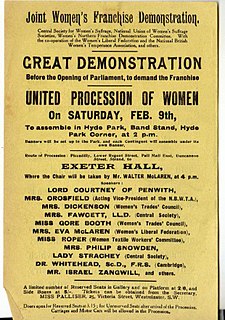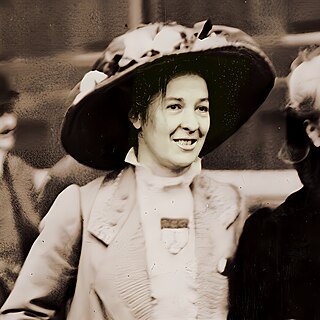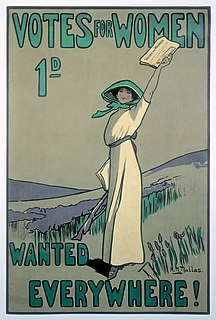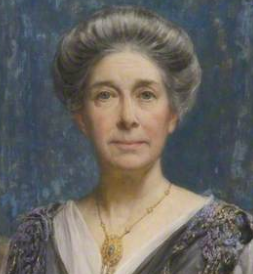
Dame Millicent Garrett Fawcett was an English politician, writer and feminist. She campaigned for women's suffrage by legal change and in 1897–1919 led Britain's largest women's rights association, the National Union of Women's Suffrage Societies (NUWSS), explaining, "I cannot say I became a suffragist. I always was one, from the time I was old enough to think at all about the principles of Representative Government." She tried to broaden women's chances of higher education, as a governor of Bedford College, London and co-founding Newnham College, Cambridge in 1875. In 2018, a century after the Representation of the People Act, she was the first woman honoured by a statue in Parliament Square.

Adela Constantia Mary Pankhurst Walsh was a British born suffragette who worked as a political organiser for the WSPU in Scotland. In 1914 she moved to Australia where she continued her activism and was co-founder of both the Communist Party of Australia and the Australia First Movement together with her husband, Tom Walsh.
The Representation of the People Act 1928 was an Act of the Parliament of the United Kingdom. This act expanded on the Representation of the People Act 1918 which had given some women the vote in Parliamentary elections for the first time after World War I. The 1928 Act widened suffrage by giving women electoral equality with men. It gave the vote to all women over 21 years old, regardless of property ownership. Prior to this act only women over 30 who met minimum property qualifications could vote. Similar provision was made for the Parliament of Northern Ireland by the Representation of the People Act 1928.

The National Union of Women's Suffrage Societies (NUWSS), also known as the suffragists was an organisation founded in 1897 of women's suffrage societies around the United Kingdom. In 1919 it was renamed the National Union of Societies for Equal Citizenship.

Rosa May Billinghurst was a British suffragette and women's rights activist. She was known popularly as the "cripple suffragette" as she campaigned in a tricycle.

Emmeline Pethick-Lawrence, Baroness Pethick-Lawrence was a British women's rights activist and suffragette.

The United Procession of Women, or Mud March as it became known, was a peaceful demonstration in London on 9 February 1907 organised by the National Union of Women's Suffrage Societies (NUWSS), in which more than three thousand women marched from Hyde Park Corner to the Strand in support of women's suffrage. Women from all classes participated in what was the largest public demonstration supporting women's suffrage seen up to that date. It acquired the name "Mud March" from the day's weather, when incessant heavy rain left the marchers drenched and mud-spattered.

Edith How-Martyn was a British suffragette and a member of the Women's Social and Political Union (WSPU). She was arrested in 1906 for attempting to make a speech in the House of Commons. This was one of the first acts of suffragette militancy. She met Margaret Sanger in 1915 and they created a conference in Geneva. How-Martyn toured India talking about birth control. She had no children and died in Australia.

Dorothy (Dora) Frances Montefiore was an English-Australian women's suffragist, socialist, poet, and autobiographer.

A movement to fight for women's right to vote in the United Kingdom finally succeeded through laws in 1918 and 1928. It became a national movement in the Victorian era. Women were not explicitly banned from voting in Great Britain until the Reform Act 1832 and the Municipal Corporations Act 1835. In 1872 the fight for women's suffrage became a national movement with the formation of the National Society for Women's Suffrage and later the more influential National Union of Women's Suffrage Societies (NUWSS). As well as in England, women's suffrage movements in Wales, Scotland and other parts of the United Kingdom gained momentum. The movements shifted sentiments in favour of woman suffrage by 1906. It was at this point that the militant campaign began with the formation of the Women's Social and Political Union (WSPU).
Minnie Lansbury née Minnie Glassman was an English leading suffragette and an alderman on the first Labour-led council in the Metropolitan Borough of Poplar, England.

Margaret Haig Mackworth, 2nd Viscountess Rhondda was a Welsh peeress, businesswoman and active suffragette who was significant in the history of women's suffrage in the United Kingdom.

Priscilla Bright McLaren was a British activist who served and linked the anti-slavery movement with the women's suffrage movement in the nineteenth century. She was a member of the Edinburgh Ladies' Emancipation Society and, after serving on the committee, became the president of the Edinburgh Women's Suffrage Society.

Julia Scurr was a British politician and suffragette.

Catherine Osler or Catherine Courtauld Osler; Catherine Courtauld Taylor was a British social reformer and suffragist.

Lucy Minnie Baldock was a British suffragette. Along with Annie Kenney, she co-founded the first branch in London of the Women's Social and Political Union.

Annot Robinson, nicknamed Annie, was a Scottish suffragette and pacifist. She was sentenced to six months for trying to break in to the House of Commons. She helped to found the Women’s International League for Peace and Freedom.
Reverend Claude Hinscliff (1875–1964) was a British suffragist.

The statue of Millicent Fawcett in Parliament Square, London, honours the British suffragist leader and social campaigner Dame Millicent Fawcett. It was made in 2018 by Gillian Wearing. Following a campaign and petition by the activist Caroline Criado Perez, the statue's creation was endorsed by both the Prime Minister of the United Kingdom, Theresa May, and the Mayor of London, Sadiq Khan. The statue, Parliament Square's first monument to a woman and also its first sculpture by a woman, was funded through the government's Centenary Fund, which marks 100 years since some women won the right to vote. The memorial was unveiled on 24 April 2018.

Lolita Roy, also known as Mrs. P. L. Roy, was an Indian social reformer and suffragist who played an active role in the social life of Indians in London, as well as in campaigns for women's suffrage in Britain and India. She was described in The Vote in 1911 as 'one of the most emancipated of Indian women'.



















